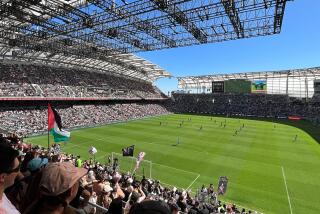Brazil protest gains supporters after police crackdown
- Share via
Reporting from Recife, Brazil — A police crackdown in the northeastern Brazil city of Recife has generated support for protesters occupying land in a historic area to try to stop a high-rise development project.
Many people, including rights activists, said police used excessive force last week in removing members of the Occupy Estelita and Urban Rights movements from an area that was sold by the federal government to private developers. Video of authorities using rubber bullets, batons, and tear gas in an area known as Cais Jose Estelita in Recife, a World Cup host city, was widely shared online.
The Occupy Estelita movement has been one of the few groups to assemble large numbers during the international soccer tournament. The protest is far enough away from the downtown FIFA celebrations and the local Arena Pernambuco — where the U.S. will play Germany on Thursday — to stay clear of most tourists. Demonstrators have kept off roads, avoiding disruption.
Supporters gathered Sunday at the small encampment, now across the street from the contested land, for a day that included an outdoor concert. Many people said it was they first time they had joined in, though protesters have been camping at the site for about a month. A member of Urban Rights said about 2,000 to 3,000 people participated in the event.
“They’ve been fighting this New Recife project since 2012, because the last thing this area needs is entirely private spaces and skyscrapers that will ruin the view and clog up the streets,” said Rodrigo Acioli, a local publisher. “But I was nothing more than, you might say, a Facebook supporter, until I saw Tuesday’s violence.”
The New Recife project calls for 12 high-rise buildings, including residences, hotels and other businesses, along the coast between the city’s historic downtown and its more upscale Boa Viagem neighborhood. Opponents say the plan has not gone through the proper channels required for a historic piece of public land, and that the project would create closed-off spaces for the rich and negatively affect surrounding residents and the city’s growth.
“We want the current plan replaced with one that is discussed with the population before it is approved. The current project has been pushed through via a series of illegal actions,” said Ricardo Alves, a lawyer working with Urban Rights. “This is a historic part of the city. If you put up these towers you destroy the view. Recife’s citizens should be able to insist on more public space.”
A statement from Recife City Hall said that courts had so far not identified legal irregularities in the project but that local officials were committed to mediation between the protesters and the consortium of construction companies behind the project, which could still be revised.
“A space for dialogue is still open, until the two sides can come to an agreement,” the statement said. “The priority is a positive legacy for the city.”
In Brazil, state governments are responsible for security and the police, and the forced removal of the demonstrators came at the request of the construction companies involved in the project, the city statement said.
Many of those assembled Sunday spoke not only of the legality of the process, but also of a development model they said favors the rich and large construction companies. The conflict’s link to the World Cup, many say, is only indirect, as Brazil’s large and politically influential construction companies were widely seen as the main benefactors of the country’s 12 high-cost World Cup stadiums.
Tents have been set up on public land under a freeway overpass, and on Sunday supporters sold T-shirts, painted walls, played music, and sold snacks. Some are living there, while others came to show support.
“They can’t just destroy the existing sheds and put in what some companies want,” says Mayara Monique Rodrigues, a 17-year old student who was visiting the site for the first time. “That’s the kind of thing that has caused so much anger and demonstrations over the last year, including around the World Cup stadiums: excluding public participation and public space.”
Bevins is a special correspondent.
More to Read
Sign up for Essential California
The most important California stories and recommendations in your inbox every morning.
You may occasionally receive promotional content from the Los Angeles Times.










